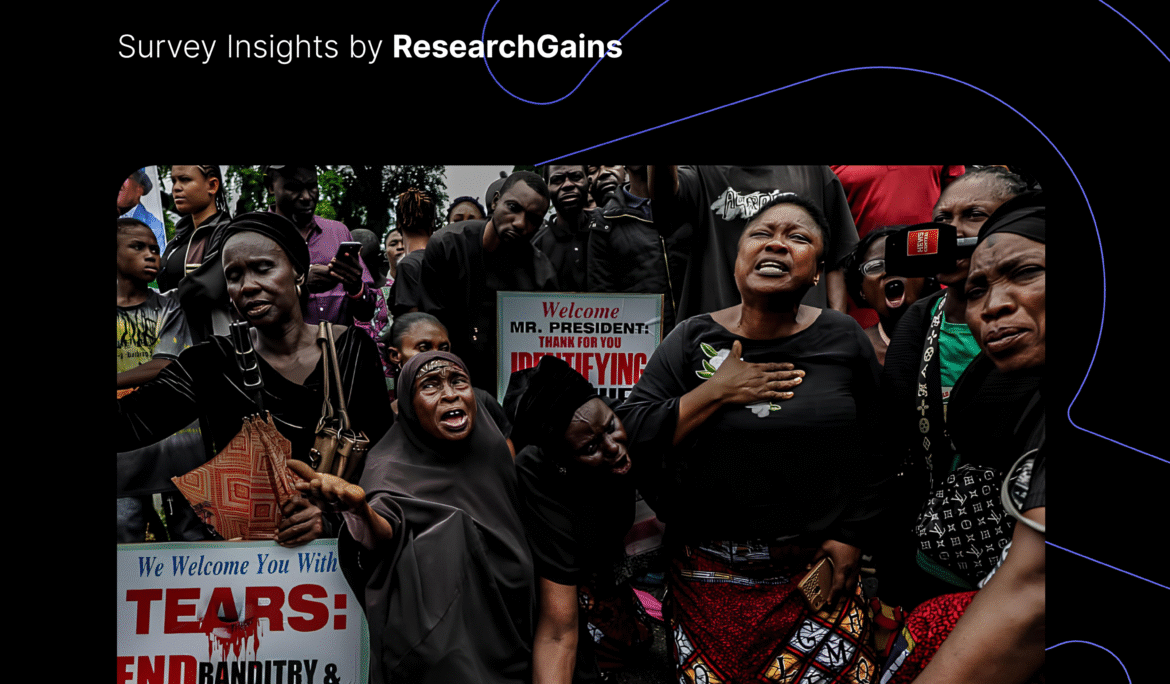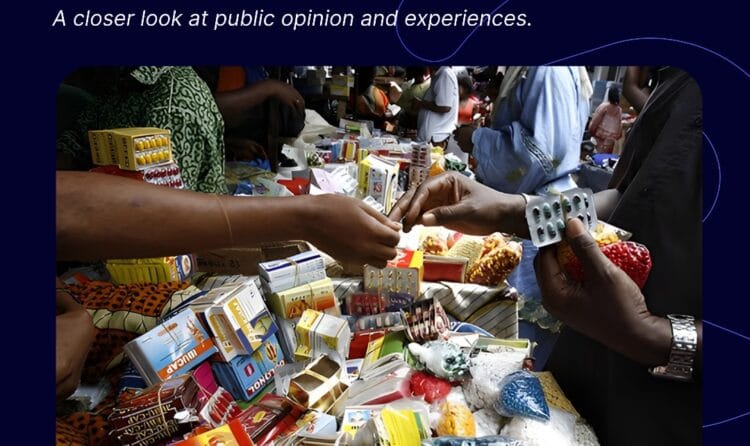Introduction
Benue State, once known as the “Food Basket of the Nation,” has become a tragic symbol of Nigeria’s deepening insecurity crisis. For years, reports of attacks, displacement, and violent killings have poured in from the region. These events are not just statistics, they represent shattered families, lost livelihoods, and communities living in fear.
At ResearchGains, we believe it is important to go beyond headlines. What do Nigerians think about the situation in Benue? Who do they believe is responsible? What are their biggest concerns, and what solutions do they hope for?
To answer these questions, we conducted a nationwide survey, asking Nigerians how they perceive the killings in Benue and the broader issues of insecurity. The results paint a sobering yet necessary picture, one that reveals public frustration, distrust, and an urgent call for action.
This article breaks down each chart from our findings with expert analysis, to help policymakers, researchers, and citizens understand the pulse of the nation.
How do Nigerians feel about the current state of security?
50% say the situation is “extremely alarming”
30% describe it as “poor”
12% think it is “manageable”
Only 8% feel “very secure”
A staggering 80% of Nigerians believe security is either alarming or poor, showing that insecurity is not just a Benue problem, it is a national emergency. The data indicates widespread fear and a deep sense of vulnerability. When half the population considers the situation “extremely alarming,” it sends a clear message: people are losing faith in the government’s ability to keep them safe.
What’s fueling the violence in Benue State?
26% point to farmer–herder conflict
22% blame political manipulation
18% cite ethnic/religious tensions
34% admit they “don’t know”
While land disputes between farmers and herders remain a dominant narrative, a significant portion of Nigerians also see politics and ethno-religious divisions as root causes. However, the 34% who are unsure reflect a dangerous information gap. This lack of clarity could stem from inconsistent media coverage or government communication failures, and it hampers public understanding of the crisis.
Accountability: Who Should Act?
78% say “All of the above”, Federal Government, State Government, Security Agencies, and Local Communities
14% hold the Federal Government solely accountable
Others place blame on state (2%), security agencies (2%), or local communities (2%)
2% think no one is responsible
There is a strong call for collective responsibility, with most Nigerians demanding that every level of government and community leadership play a role. However, the fact that 14% single out the Federal Government shows that people expect central leadership and coordination in matters of national security.
Was There a Timely Government Response?
58% say the government did not respond promptly
16% are unsure
12% believe the response was somewhat timely
Only 14% feel it was adequate
A majority of respondents view the federal government’s response as delayed or inadequate. This further compound the trust deficit between the public and government institutions. In times of crisis, delay is dangerous, and perception matters as much as reality. Swift and visible action could go a long way in restoring public confidence.
Media Coverage: Fair or flawed?
56% say there’s not enough coverage
16% think the media is too biased
20% say coverage is fair
8% don’t follow news on insecurity
Public sentiment suggests that the media is underreporting or misrepresenting the crisis. With over 70% expressing dissatisfaction, it is clear that the media needs to do more in terms of balanced, consistent, and thorough reporting. This also raises the question: are some voices being intentionally silenced?
The Biggest Concern About Insecurity?
68% say “All of the above”, loss of lives, displacement, and weak justice systems
20% focus on loss of lives
8% worry about the justice system
4% mention displacement
Most Nigerians see the crisis as multi-dimensional, not just about deaths, but also broken systems and fractured communities. The overwhelming support for “all of the above” suggests that any response strategy must be holistic, addressing both the root causes and the aftershocks.
Is There Government Bias?
54% say Yes
26% say Maybe
12% say No
8% prefer not to say
More than half of respondents believe there is bias in how the government handles security threats, especially in ethnically or religiously charged regions like Benue. This is alarming and shows the need for a transparent and impartial approach to crisis management.
What Will Make Nigerians Feel Safer?
42% want arrests and prosecutions
22% call for more security forces
18% want public action plans
18% demand transparent investigations
Justice is a top priority. Nigerians are not just asking for more boots on the ground, they want accountability and due process. The call for transparent investigations and public planning underscores the need for clarity, consistency, and consequences in government action.
Conclusion
The people of Benue, and Nigerians at large, are not only worried about the bloodshed; they are disillusioned by what they perceive as inaction, bias, and lack of transparency from those in power. This survey paints a picture of a nation in distress, desperate for security reforms, unbiased leadership, and meaningful justice.
At ResearchGains, we believe in the power of public opinion to shape policy. We listen to voices from every corner of Nigeria, amplifying their concerns, frustrations, and hopes, so that real change becomes possible.
Your Voice Matters
Want more data-driven insights into Nigeria’s most pressing issues?
Follow us on Twitter/X
Share this article to raise awareness
Join the conversation with #ResearchGains





